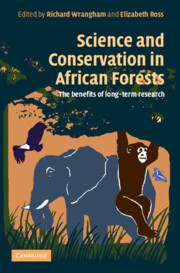Book contents
- Frontmatter
- Contents
- List of contributors
- Foreword
- Preface
- Acknowledgments
- 1 Why the link between long-term research and conservation is a case worth making
- 2 Links between research and Protected Area management in Uganda
- 3 The use of research: how science in Uganda's National Parks has been applied
- 4 Long-term research and conservation in Kibale National Park
- 5 Monitoring forest–savannah dynamics in Kibale National Park with satellite imagery (1989–2003): implications for the management of wildlife habitat
- 6 Long-term studies reveal the conservation potential for integrating habitat restoration and animal nutrition
- 7 Long-term perspectives on forest conservation: lessons from research in Kibale National Park
- 8 Health and disease in the people, primates, and domestic animals of Kibale National Park: implications for conservation
- 9 The importance of training national and international scientists for conservation research
- 10 Community benefits from long-term research programs: a case study from Kibale National Park, Uganda
- 11 Potential interactions of research with the development and management of ecotourism
- 12 The human landscape around the Island Park: impacts and responses to Kibale National Park
- 13 Conservation and research in the Budongo Forest Reserve, Masindi District, Western Uganda
- 14 Long-term research and conservation in Gombe National Park, Tanzania
- 15 Long-term research and conservation in the Mahale Mountains, Tanzania
- 16 The contribution of long-term research by the Taï Chimpanzee Project to conservation
- 17 The Green Corridor Project: long-term research and conservation in Bossou, Guinea
- 18 Long-term research and conservation of the Virunga mountain gorillas
- 19 Long-term research and conservation of great apes: a global future
- 20 Long-term research and conservation: the way forward
- Index
- References
11 - Potential interactions of research with the development and management of ecotourism
Published online by Cambridge University Press: 06 July 2010
- Frontmatter
- Contents
- List of contributors
- Foreword
- Preface
- Acknowledgments
- 1 Why the link between long-term research and conservation is a case worth making
- 2 Links between research and Protected Area management in Uganda
- 3 The use of research: how science in Uganda's National Parks has been applied
- 4 Long-term research and conservation in Kibale National Park
- 5 Monitoring forest–savannah dynamics in Kibale National Park with satellite imagery (1989–2003): implications for the management of wildlife habitat
- 6 Long-term studies reveal the conservation potential for integrating habitat restoration and animal nutrition
- 7 Long-term perspectives on forest conservation: lessons from research in Kibale National Park
- 8 Health and disease in the people, primates, and domestic animals of Kibale National Park: implications for conservation
- 9 The importance of training national and international scientists for conservation research
- 10 Community benefits from long-term research programs: a case study from Kibale National Park, Uganda
- 11 Potential interactions of research with the development and management of ecotourism
- 12 The human landscape around the Island Park: impacts and responses to Kibale National Park
- 13 Conservation and research in the Budongo Forest Reserve, Masindi District, Western Uganda
- 14 Long-term research and conservation in Gombe National Park, Tanzania
- 15 Long-term research and conservation in the Mahale Mountains, Tanzania
- 16 The contribution of long-term research by the Taï Chimpanzee Project to conservation
- 17 The Green Corridor Project: long-term research and conservation in Bossou, Guinea
- 18 Long-term research and conservation of the Virunga mountain gorillas
- 19 Long-term research and conservation of great apes: a global future
- 20 Long-term research and conservation: the way forward
- Index
- References
Summary
INTRODUCTION
Wildlife-related research is the foundation of wildlife management and especially of tourism development. Research provides vital information that generates, in potential tourists, an interest in and a desire to see wildlife, and adds value to the tourism products offered by wildlife managers and tour guides.
Ecotourism has come to be an illusive term. It is often so loosely applied that, at times, it can mean everything or nothing about the tourist experience on offer. In this chapter ecotourism is defined as that kind of tourism which is nature-based but which is also designed to impart understanding and learning about the culture and history of a given environment. Local communities benefit while at the same time care is taken not to alter the integrity of the ecosystems.
Based on this definition of ecotourism, I argue that to understand and learn more about a given ecosystem, long-term research is essential. This is particularly crucial for the understanding of those natural processes that take a long time to manifest themselves. I also point out that particularly valuable tourist sites, such as those that allow visitors to see primates, have followed in the wake of long-term research programs.
It is commonly believed among local people in Uganda that big mammals such as chimpanzees (Pan troglodytes) and gorillas (Gorilla gorilla) are dangerous and therefore should be killed. However, due to the information about these animals resulting from established research projects and the educational outreach that accompanies them, attitudes based on such false beliefs have changed.
- Type
- Chapter
- Information
- Science and Conservation in African ForestsThe Benefits of Longterm Research, pp. 115 - 128Publisher: Cambridge University PressPrint publication year: 2008
References
- 4
- Cited by



